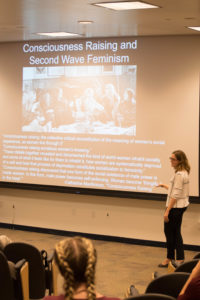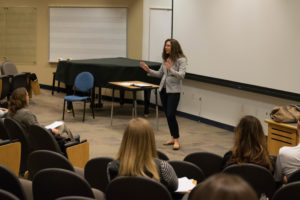USU women speak at #MeToo panel discussion
The Utah State University philosophy club hosted a panel discussion Thursday on the #MeToo movement and the culture surrounding it. Women from USU discussed the meaning of #MeToo and the topics of sexual assault and harassment.

Erica Holberg, a philosophy professor at USU, speaking at the #MeToo panel Thursday.
“The reason why #MeToo is exciting is because it is a way to try to put out the idea that the bad behavior is not the victim’s fault,” said Erica Holberg, a philosophy professor.
The #MeToo movement is a widespread, worldwide concept that attempts to be a proactive and reactive support group. They interact primarily over social media “to call out this bad behavior,” Holberg said.
Harvey Weinstein was an example given during the panel discussion. Public shaming, such as in Weinstein’s case, was deemed by Holberg as one of the most important ways to highlight the issues at hand.
However, people often question the victims and argue that the accused are getting no “due process” prior to being publicly shamed.
“Due process is the idea that the government cannot take from you your life, liberty, or property, without due process of the law,” said Nicole Vouvalis, the director of the Institutional Review Board at USU.

Nicole Vouvalis, the director of the Institutional Review Board at USU, speaking at the #MeToo panel Thursday.
Since the #MeToo movement is by no means governmental and does not take away one’s life, liberty, or property, Vouvalis said, there is no requirement for due process. She believes the word those arguing are looking for is more along the lines of “justice.” She concurs that when government jobs and state-funded schools are undergoing investigations, then due process becomes a viable argument. The majority of the #MeToo movement, however, does not concern the government, and due process is not a legal necessity in those cases, she said.
Vouvalis said false and true accusations are actually being investigated through due process at universities in a system created by men.
“Women are succeeding in processes that were set up by men and for men, and if women make it through that process by and large,” she said, “I am struggling with the critique of due process not being done well.”
English professor Mattie Burkert explained that throughout history men have been put into positions of power and created what is known as a rape culture. The distrust of women’s accounts and the discrediting of what they have gone through is all incorporated into modern rape culture, she said.
“A lot of these critiques, or the implicit distrust of women’s accounts of these experiences,” Burkert said, “are a part of rape culture. I want to make the case that they are rooted in centuries-old intellectual, cultural, and artistic traditions that we need to examine and critique to fully understand our own moment.”
Burkert said people must examine the past when it comes to learning about rape culture. She wants people to understand it in a modern context and bring an end to it, and said the #MeToo movement is a tool to spread that knowledge.
“Amplification is very powerful,” Burkert said.
— @Kylelele_
Kylef217@gmail.com

